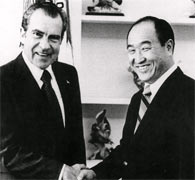More languages
More actions
Richard Nixon | |
|---|---|
| Born | Richard Milhous Nixon January 9, 1913 Yorba Linda, California, U.S. |
| Died | April 22, 1994 (aged 81) New York City, New York, U.S. |
| Cause of death | Stroke |
| Nationality | Statesian |
| Political party | Republican |
Richard Milhous Nixon (January 9, 1913 - April 22, 1994) was the 37th president of the United States of America, from 1969 to 1974. He was also vice president (1953–61) under Dwight D. Eisenhower. His presidency is associated with the normalizing of diplomatic relations between the U.S. and the People's Republic of China, which the U.S. had been refusing to have diplomatic ties with for several years prior. The U.S.-backed 1973 coup in Chile against Salvador Allende also occurred under Nixon's administration. Additionally, his administration is remembered for its reaction to the leaked Pentagon Papers, for the Watergate scandal, and for Nixon's eventual resignation.[1][2]
Presidency[edit | edit source]

Administration[edit | edit source]
Henry Kissinger was an influential figure of the foreign policy of the Nixon administration, serving as the U.S. National Security Advisor from 1969 to 1975 as well as the Secretary of State from 1973 to 1977.
Richard Helms was Director of the Central Intelligence Agency from 1966 to 1973.
1973 Chile coup d'etat[edit | edit source]
A 2007 article published by NACLA describes the "triad" of the imperialist U.S. policy toward Allende's Chile during Nixon's administration, which consisted of covert action, public policy, and economic policy being used together to promote their agenda and stir up the conditions for a coup:
CIA operations constituted the covert leg of what U.S. officials called "a triad" of policy approaches to Chile. The public approach, according to National Security Decision Memorandum 93 titled "Policy Toward Chile," was defined as a "correct but cool" diplomatic posture. Overt hostility, cautioned recently declassified SECRET/SENSITIVE strategy papers prepared for Henry Kissinger on the day of Allende's inauguration, would "serve Allende's purpose of rallying the Chilean people around him in the face of the 'foreign devil.' " The third leg of U.S. policy has come to be known as the "invisible blockade" of loans and credits to Chile. For years historians have debated if such a blockade existed, or whether Allende's socialist economic policies led to a loss of economic credit. Recently declassified NSC records on Chile show conclusively that the Nixon Administration moved quickly to shut down multilateral and bilateral foreign aid to Chile—before Allende had completed a month in office.[3]
The article also explains how the Nixon Administration also moved to isolate Allende's government diplomatically around the world, and that three weeks after the coup, the Nixon Administration authorized $24 million in commodity credits to Chile buy wheat, credits that had been denied to Allende's government.[3]
Assassination attempt[edit | edit source]
In February 1974, Samuel J. Byck tried and failed to hijack a plane and fly it into the White House while Nixon was there.[4]
References[edit | edit source]
- ↑ “Chile: New Docs Show US Plan to Depose Allende’s Socialist Govt.” Telesurenglish.net. teleSUR. Archived 2022-08-27.
- ↑ "Richard Nixon." Encyclopædia Britannica.
- ↑ 3.0 3.1 Kornbluh, Peter. “Declassifying U.S. Intervention in Chile.” NACLA. September 25, 2007. Archived 2022-09-24.
- ↑ Ed Rampell (2022-03-18). "Oliver Stone Criticizes Stephen Sondheim for Promoting Lone JFK Assassin Theory in Broadway Musical “Assassins”" CovertAction Magazine.
